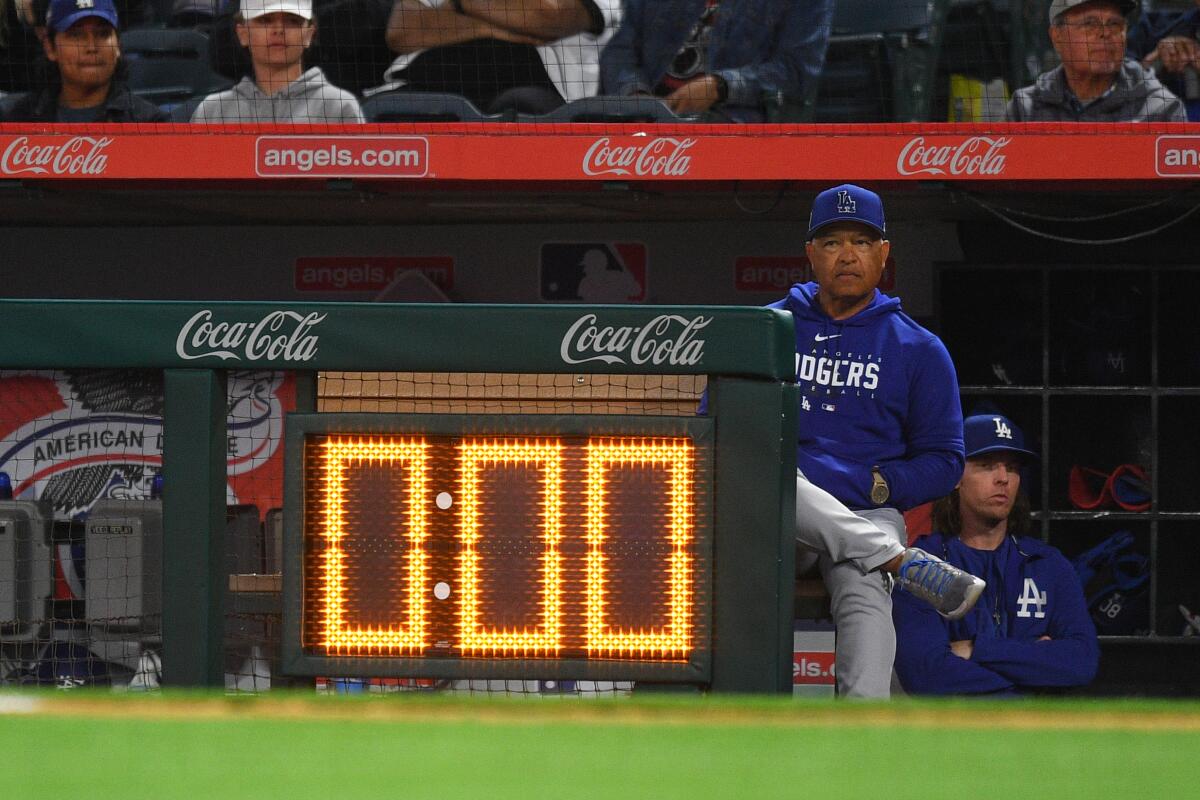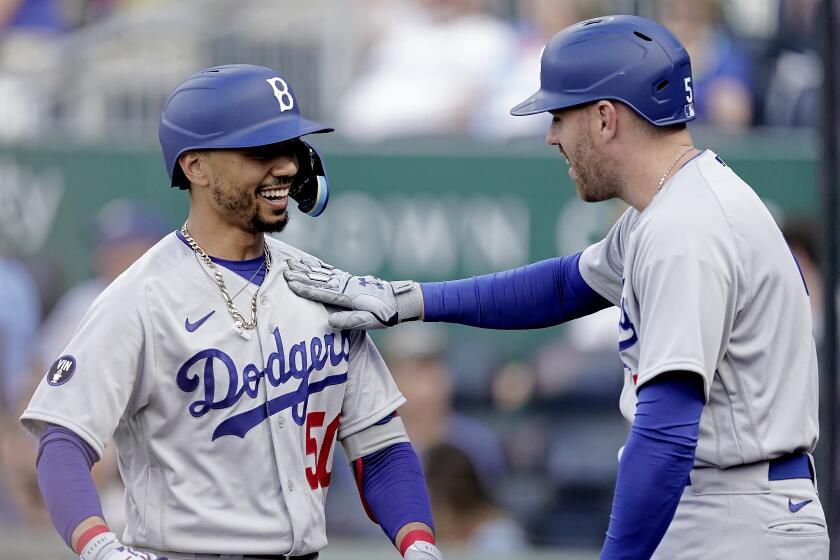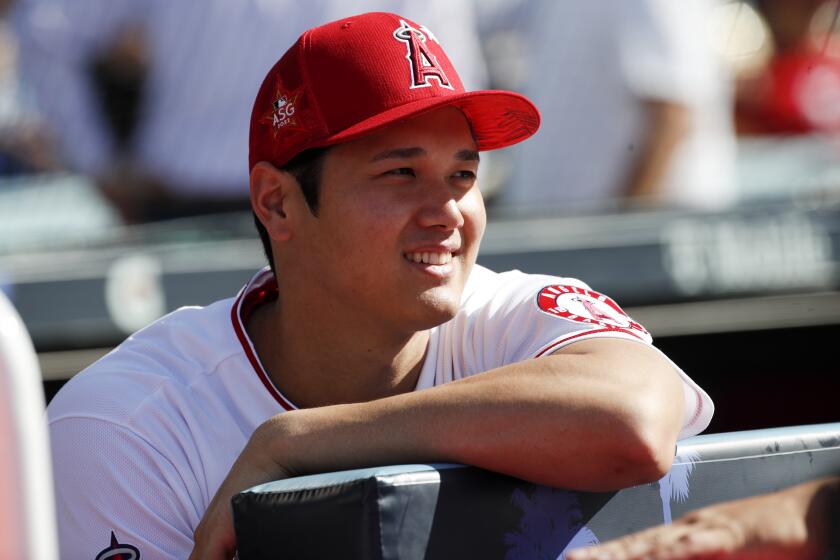‘We’ve just got to figure it out.’ Dodgers, Angels brace for pitch clock implications

- Share via
Bases loaded, two outs, bottom of the ninth inning, home team down by a run, full count on the batter, who steps out of the box to take a deep breath and gather himself while the pitch clock winds down from nine seconds, to eight seconds, to seven seconds …
Strike three! Game over!
Dodgers manager Dave Roberts did not hesitate this week when asked how he liked baseball’s new pitch clock, which requires pitchers to start their delivery within 15 seconds of receiving the ball with the bases empty and 20 seconds with a runner on, and batters to be set and looking at the pitcher with eight seconds left on the clock.
After perhaps the most extensive offseason roster turnover of Andrew Friedman’s tenure, the Dodgers enter the 2023 MLB season in a transitional phase.
“Love it,” Roberts said enthusiastically. “I think the players are adjusting to it, but just the rhythm of the game, the time of the game … all that is going to leave everyone wanting for more the next day, and I think that’s a good thing.”
But Roberts might not be praising the pitch clock in late September if an automatic strike ends a one-run Dodgers loss that has National League West race implications.
“It’s just gonna be more frustrating when there’s [a pitch clock] infraction in a big moment,” Dodgers pitcher Clayton Kershaw said. “You don’t want playoff games, big important games down the stretch, decided by that. We don’t want any game decided by that. But I don’t think we’re gonna get any grace, so we’ve just got to figure it out.”
If there is one thing umpires made clear during a month’s worth of exhibitions leading up to Thursday’s opening day, it’s that pitch clock rules will be strictly enforced.
There have been adjustments since the start of spring training, allowing extra time for players to address malfunctioning PitchCom units, for hitters to get back into the box after brushback pitches or big swings that knock equipment out of place, and for pitchers to return to the mound after covering first or backing up a base.
But once the clock starts, and a pitcher has used his two “disengagements” per at-bat, and a batter has used his one timeout per plate appearance, there is no stopping it, no matter the inning, the score or how pressure-packed the situation.
“In my opinion, it’s hitters who slowed the pace of play. In those bigger moments, they want to slow things down, control the tempo, their heartbeat, and that’s why the game comes to a standstill. But you’re not going to have that luxury anymore.”
— Dave Roberts, Dodgers manager
“I just think you have to refocus a little quicker,” Dodgers utility man Chris Taylor said. “In the past, you’d kind of step out, take a few breaths to slow things down and get back in there. You can’t really do that anymore. So you maybe take one breath, get back in the box and be ready.”
Though there are plenty of notoriously slow-working pitchers — Angels ace Shohei Ohtani and former Dodgers relievers Kenley Jansen and Pedro Baez come to mind — Roberts believes the pitch clock will require more adjustments from hitters, not pitchers.
“Most pitchers like working quick,” Roberts said. “There are outliers, guys who work really slow, but in my opinion, it’s hitters who slowed the pace of play. In those bigger moments, they want to slow things down, control the tempo, their heartbeat, and that’s why the game comes to a standstill. But you’re not going to have that luxury anymore.”

The pitch clock is clearly working, shaving about 25 minutes off game times this spring. The Dodgers’ 3-0 win over the Angels at Chavez Ravine on Sunday night took a mere 2 hours 8 minutes, after which Kershaw said, “Hopefully, they sell enough beer.”
A 5-4 Angels victory over the Dodgers in Anaheim on Monday night featured 20 hits, including six homers, and 18 strikeouts and still took only 2 hours 36 minutes.
“I think it’s going pretty smooth,” Angels manager Phil Nevin said. “We started off in the spring with a lot of violations, people not understanding it, but I think it’s kind of becoming the norm already. I think it’s good for our game to keep the pace moving.”
Pace-of-play rules are not limited to the pitch clock. Replay rules have also changed. Managers now must hold up their hands immediately to signal to the umpires that they are considering a challenge, and they will have only 15 seconds from that point to inform the crew chief that they want a play reviewed.
Managers previously had 10 seconds to signal to umps they were considering a challenge and 20 seconds from that point to decide whether to challenge the play.
“The mechanics of it … we’ve got to make a decision sooner,” Roberts said. “We don’t have that 10-second grace period to decide if we’re going to challenge or not.”
The Angels have retooled their roster, hoping to play their way into postseason contention and give Shohei Ohtani a reason to remain in Anaheim.
The tighter window will pressure replay specialists to find the best camera angle to make a determination quicker than they did in past years.
Home plate umpires, who communicate with field timing coordinators in the press box through an earpiece and microphone, will add 15 seconds to each of the four pitch clocks — one by each dugout, two beyond the center-field wall — to time replay reviews.
This came as a relief to Roberts, who initially thought another clock might be added.
“You know what?” Roberts said. “We’ve got plenty of clocks around now.”
More to Read
Go beyond the scoreboard
Get the latest on L.A.'s teams in the daily Sports Report newsletter.
You may occasionally receive promotional content from the Los Angeles Times.













